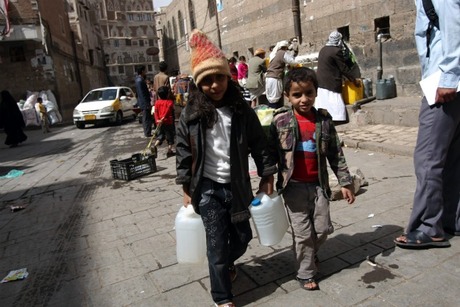U.N.: Humanitarian Crisis Could Sink Yemen Transition

Yemen's near-forgotten humanitarian crisis could sink its Arab Spring political transition, with a new constitution and elections expected by next year, a senior United Nations aid official warned Thursday.
"In Yemen today, stability is threatened by the drastic humanitarian situation," said Ismail Ould Cheikh Ahmed, the U.N.'s Yemen aid coordinator.
He reeled off the stark data, saying that more than half of Yemen's 24 million people needed aid.
Of those, 13 million lack access to safe water, 10 million go hungry, six million miss out on even basic healthcare, while farmers have shifted from growing food to producing the drug khat.
"The whole political transition could collapse if we don't deal with it," said Ahmed, saying a "window of opportunity" could be lost as the crisis stokes tensions in the impoverished nation.
The humanitarian crisis is "little known" beyond Yemen's borders, Ahmed noted, with reporting focused on the battle with al-Qaida.
Over 300,000 Yemenis remain internally displaced by conflict in the north and south of the country.
In addition, Yemen hosts 300,000 refugees, the bulk from lawless Somalia, plus tens of thousands of illegal migrants chiefly from Ethiopia who have been stranded as they try to reach the Gulf.
After 33 years as head of state, Yemen's president Ali Abdullah Saleh left power in February 2012 as part of a Saudi-brokered deal signed in November the previous year.
Under the accord, a new constitution and general elections are due in February 2014, but Saleh has been accused of meddling in the fragile process.
Besides trying to end years of factional strife, the transitional authorities face al-Qaida insurgents, who in 2011 took advantage of weakened central government control to seize swathes of south and east Yemen.
The army, backed by U.S. drone strikes, last year pushed the militants into the mountains, but they still launch hit-and-run attacks.
Ahmed said that the U.N.'s aid effort in the country was severely underfunded, mustering just 28 percent of the $716 million needed this year.
"We can make the situation turn around, but unfortunately this requires strong support from the international community, which is not coming," said Ahmed.



